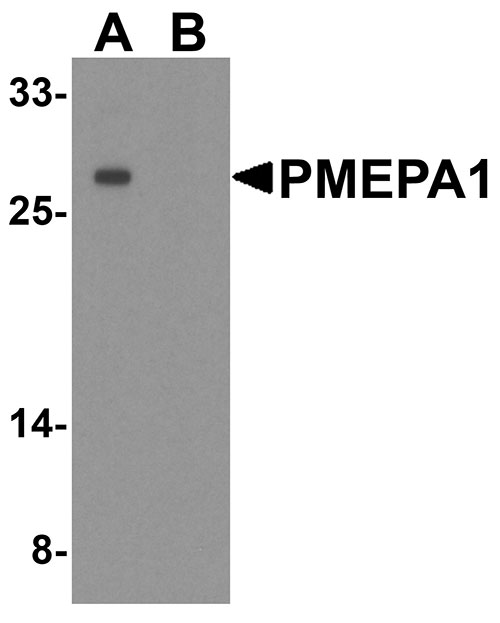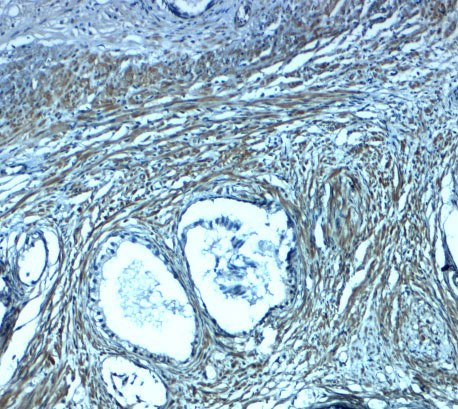PMEPA1 Antibody
- SPECIFICATION
- CITATIONS
- PROTOCOLS
- BACKGROUND

Application
| WB, IHC, E |
|---|---|
| Primary Accession | Q969W9 |
| Other Accession | NP_064567, 21361841 |
| Reactivity | Human, Mouse, Rat |
| Host | Rabbit |
| Clonality | Polyclonal |
| Isotype | IgG |
| Calculated MW | Predicted: 26, 28, 32 kDa Observed: 27 kDa |
| Application Notes | PMEPA1 antibody can be used for detection of PMEPA1 by Western blot at 1 - 2 µg/ml. Antibody can also be used for immunohistochemistry starting at 2.5 µg/mL. |
| Gene ID | 56937 |
|---|---|
| Target/Specificity | PMEPA1; PMEPA1 antibody is human, mouse and rat reactive. At least four isoforms are known to exist; this antibody will detect all of the isoforms. |
| Reconstitution & Storage | PMEPA1 antibody can be stored at 4℃ for three months and -20℃, stable for up to one year. |
| Precautions | PMEPA1 Antibody is for research use only and not for use in diagnostic or therapeutic procedures. |
| Name | PMEPA1 |
|---|---|
| Synonyms | STAG1, TMEPAI |
| Function | Functions as a negative regulator of TGF-beta signaling and thereby probably plays a role in cell proliferation, differentiation, apoptosis, motility, extracellular matrix production and immunosuppression. In the canonical TGF-beta pathway, ZFYVE9/SARA recruits the intracellular signal transducer and transcriptional modulators SMAD2 and SMAD3 to the TGF-beta receptor. Phosphorylated by the receptor, SMAD2 and SMAD3 then form a heteromeric complex with SMAD4 that translocates to the nucleus to regulate transcription. Through interaction with SMAD2 and SMAD3, LDLRAD4 may compete with ZFYVE9 and SMAD4 and prevent propagation of the intracellular signal (PubMed:20129061, PubMed:24627487). Also involved in down-regulation of the androgen receptor (AR), enhancing ubiquitination and proteasome- mediated degradation of AR, probably by recruiting NEDD4 (PubMed:18703514). |
| Cellular Location | Early endosome membrane; Single-pass membrane protein. Golgi apparatus membrane; Single-pass membrane protein |
| Tissue Location | Highest expression in prostate. Also expressed in ovary |

Thousands of laboratories across the world have published research that depended on the performance of antibodies from Abcepta to advance their research. Check out links to articles that cite our products in major peer-reviewed journals, organized by research category.
info@abcepta.com, and receive a free "I Love Antibodies" mug.
Provided below are standard protocols that you may find useful for product applications.
Background
The prostate transmembrane protein, androgen induced 1 (PMEPA1) protein is a transmembrane protein that contains a Smad interacting motif (SIM) (1,2). Expression of this gene is induced by androgens and transforming growth factor beta, and the encoded protein suppresses the androgen receptor and transforming growth factor beta signaling pathways though interactions with Smad proteins (3). Overexpression of this gene may play a role in multiple types of cancer (2,4).
References
Xu LL, Shanmugam N, Segawa T, et al. A novel androgen-regulated gene, PMEPA1, located on chromosome 20q!3 exhibits high level expression in prostate. Genomics 2000; 66:257-63.
Rae FK, Hooper JD, Nicol DL, et al. Characterization of a novel gene, STAG1/PMEPA1, upregulated in renal cell carcinoma and other solid tumors. Mol. Carcinog. 2001; 32:44-53.
Watanabe Y, Itoh S, Goto T, et al. TMEPAI, a transmembrane TGF-beta-inducible protein, sequesters Smad proteins from active participation in TGF-beta signaling. Mol. Cell 2010; 37:123-34.
Vo Nguyen TT, Watanabe Y, Shiba A, et al. TMEPAI/PMEPA1 enhances tumorigenic activities in lung cancer cells. Cancer Sci. 2014; 105:334-41.
If you have used an Abcepta product and would like to share how it has performed, please click on the "Submit Review" button and provide the requested information. Our staff will examine and post your review and contact you if needed.
If you have any additional inquiries please email technical services at tech@abcepta.com.













 Foundational characteristics of cancer include proliferation, angiogenesis, migration, evasion of apoptosis, and cellular immortality. Find key markers for these cellular processes and antibodies to detect them.
Foundational characteristics of cancer include proliferation, angiogenesis, migration, evasion of apoptosis, and cellular immortality. Find key markers for these cellular processes and antibodies to detect them. The SUMOplot™ Analysis Program predicts and scores sumoylation sites in your protein. SUMOylation is a post-translational modification involved in various cellular processes, such as nuclear-cytosolic transport, transcriptional regulation, apoptosis, protein stability, response to stress, and progression through the cell cycle.
The SUMOplot™ Analysis Program predicts and scores sumoylation sites in your protein. SUMOylation is a post-translational modification involved in various cellular processes, such as nuclear-cytosolic transport, transcriptional regulation, apoptosis, protein stability, response to stress, and progression through the cell cycle. The Autophagy Receptor Motif Plotter predicts and scores autophagy receptor binding sites in your protein. Identifying proteins connected to this pathway is critical to understanding the role of autophagy in physiological as well as pathological processes such as development, differentiation, neurodegenerative diseases, stress, infection, and cancer.
The Autophagy Receptor Motif Plotter predicts and scores autophagy receptor binding sites in your protein. Identifying proteins connected to this pathway is critical to understanding the role of autophagy in physiological as well as pathological processes such as development, differentiation, neurodegenerative diseases, stress, infection, and cancer.



